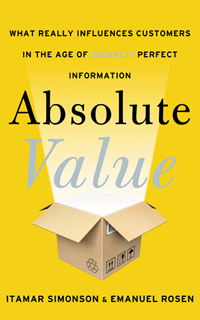Our new ‘socially intensive information environment’ lets consumers more accurately predict the actual experienced quality of goods and services before they purchase them.
Reviewed by Allan Fallow

Absolute Value is a relatively turgid book, but there’s one section in it every REALTOR® absolutely must read: In Chapter 13, “The Future of the Absolute,” co-authors Itamar Simonson and Emanuel Rosen retrace the creative thinking that led to the birth of three especially innovative websites — Farecast, GoodGuide and Zillow. Realizing they were utterly in the dark about certain common aspects of life, the developers of these sites crafted “technological flashlights” that enabled them to illuminate such formerly dark corners as the best time to buy a plane ticket, the safety of various household products and the probable value of houses for sale.
In the case of Zillow, write Simonson and Rosen, co-developers Richard Barton and Lloyd Frink were both in the market for new homes and therefore “struggling to figure out how much they should be paying for the houses they saw.” Barton and Frink collected comparable sales figures from a website run by their local county government, then entered those into a spreadsheet and “started analyzing how much the houses they were considering were actually worth.” Over time, the two men expanded and extended that exercise into the website Zillow.com, which today estimates the “price of a house or an apartment based on recent transactions in a neighborhood.”
The Information Age
I don’t normally read the sourcing notes to a book as academic in nature as Absolute Value, but in the case of Zillow, I’m glad I did: They reveal a finding by Steven Levitt and Chad Syverson that “homes owned by real estate agents sell for about 3.7 percent more than other houses.” The source notes also pointed me to a YouTube video about the genesis of Zillow (whose cited URL has unhelpfully expired), as well as to a Bloomberg Businessweek article on “Why Redfin, Zillow, and Trulia Haven’t Killed Off Real Estate Brokers.”
If you find yourself grappling with some of the larger forces that Simonson and Rosen detail in Absolute Value, such as the new primacy (some would say tyranny) of online reviews, two working papers cited by the co-authors may help you articulate your value proposition to prospective buyers — or simply reassure you of the contributions you bring to the table:
1) “Do Real Estate Brokers Add Value When Listing Services Are Unbundled?” (nber.org/papers/w13796.pdf)
2) “Market Distortions When Agents Are Better Informed: The Value of Information in Real Estate Transactions.” (nber.org/papers/w11053)
Remarkably for a book that spends so much time dissecting the dramatic rise of crowd-sourcing, social media and interpersonal influence — and the concomitant rapid decline of product branding, loyalty and positioning — the authors’ Zillow case study has a happy(ish) ending:
“[P]eople have not stopped using real estate agents with the rise of Zillow and similar services. Despite the fact that brokers can be expensive[,] sellers still want the hand-holding, assistance, assurance and expertise of brokers. The same is true for buyers who usually want help negotiating such a big transaction. However, the nature of real estate decision-making has clearly changed in the past few years. Buyers are much more informed and less susceptible to certain influences than they used to be 10 years ago.”
But it’s not merely in the realm of real estate that today’s buyers are increasingly impervious to those “certain influences.” Simonson (a Stanford marketing professor) and Rosen (author of The Anatomy of Buzz) explain how the instant availability of peer reviews about personal electronics, for example, allowed an upstart Taiwanese laptop company named ASUS to reach fifth place in worldwide PC shipments in 2012. They toss off the startling statistic that 30 percent of U.S. consumers now begin their online-purchase research at Amazon. And they cite a Nielsen survey of 28,000 Internet users in 56 nations, which revealed that online customer reviews have become the second-most-trusted source of information about consumer products. (The first-most-trusted source? Personal recommendations from family and friends.)
Knowledge Is Power
The upshot of all this is not just better decisions by consumers, but faster ones, too. The stark jump in a buyer’s ability to assess the absolute value of a product — what the co-authors somewhat pedantically dub “the acceleration of uncertainty resolution” — has sped up not only the adoption, but also the rejection, of new goods and services.
I can’t dispute the authors’ arguments about the plummeting power of brand equity and traditional marketing messages.
I simply wish they had used many more real-world examples — and far less discussion of research methodologies and customer segmentation — to make their points. Despite having been
drawn to Absolute Value by James Surowiecki’s admiring take on the book in The New Yorker, I turned its last page feeling like I could have stopped reading after this crystal-clear statement of the authors’ purpose in just the third paragraph:
“Review sites, shopping apps on smartphones, an extended network of acquaintances available through social media, and unprecedented access to experts and other sources all mean that many consumers today operate in a radically different, socially intensive information environment. In a world where consumers enjoy complete access to informed experts and various information services, where they can instantly read the opinions of previous users, it’s much easier for consumers to predict their likely experience with a product or a service — it’s easier to know the absolute value of things.”








